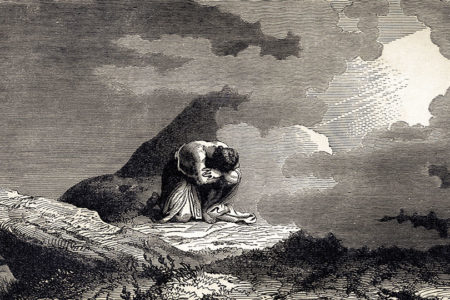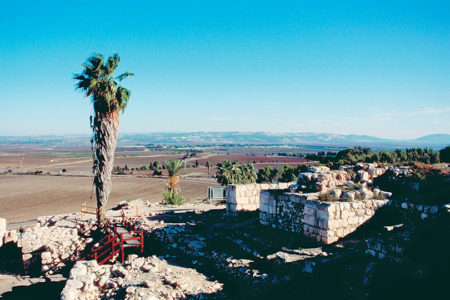How Big Is How Big Is Your God?
Boisterous shouts of celebration could be heard from Arabs throughout Jericho in May 1994. Delegates from the United States, Russia, Egypt, and the Palestine Liberation Organization (PLO) met in Cairo, Egypt. Bullied and coerced, Israel signed away the Gaza Strip and Jericho. It was part of a “peace agreement” to pacify her enemies. All it took was the stroke of a pen to relinquish a city that was a personal gift from God to Israel.
Jericho was a gift with an eternal message: The God who enabled the Israelites to overcome the seemingly insurmountable obstacle of Jericho in the fifteenth century B.C. is still big enough to tackle the issues of today. The city’s ancient ruins teach three vital lessons to help us face our personal Jerichos. First, only the God of Scripture is all-powerful. Second, in everything we must trust God, even when His plans don’t make sense to us. Finally, God is merciful, yet full of grace. This astonishing combination of mercy and grace assures true rest and peace to all who believe in Him.
God Knows No Obstacles
A story is told about an astronomer who had concluded his lecture about the Milky Way when a lady came up and asked him a question. “If our world is so little and the universe is so great,” she asked, “can we believe that God pays any attention to us?”
The astronomer replied, “That depends, madam, entirely on how big a God you believe in.”1
Jericho was a fearsome fortress. Militarily, it was the eastern door to the conquest of Canaan. If the city could be taken, the Israelite army could advance westward from the Jordan Valley and divide the country. Once divided, the Israelites could then destroy the opposition to the south and then the north.
More than three thousand years later, the brilliant British general, Edmund H. Allenby, came to the same conclusion. He applied this ancient strategy in 1917 and the result was the liberation of Israel’s homeland in World War I.
Jericho was indeed an intimidating obstacle. But it was no match for the God of Israel. While Joshua “was by Jericho,” possibly surveying the situation, a man appeared with a sword in his hand (Josh. 5:13). The man identified himself as “captain of the host of the LORD” (v. 14).
His appearance was a Christophany, a preincarnate appearance of the Second Person of the Triune God, Jesus Christ. It is also called a theophany, a visible manifestation of God. (See, Who is the ‘Angel of the LORD’?)
Joshua immediately fell with his face to the ground in worship and was told to remove his sandals. The ground had become holy because of God’s presence (cf. Ex. 3:4–5).
This unique manifestation was designed to teach Joshua two truths. First, God was his Commander in Chief; and it was God’s duty alone to devise the plan to take Jericho. Clearly, Joshua acknowledged his submission as indicated by his question: “What saith my lord unto his servant?” (v. 14).
Second, Joshua was to believe in his Supreme Commander’s unlimited power and resources. As captain of the “LORD’S host” (v. 15), his Commander had an unlimited number of angels He could call into the conflict. Only the God of Scripture is referred to as El Shaddai, “God Almighty.” This name means that He is all-powerful and able to do anything consistent with His own nature.
The many Jerichos that obstruct our personal claims to God’s promises cannot stand against such an omnipotent God. The sword of the Spirit today is God’s Word (Eph. 6:17); and our commander in chief is still God, who came in the flesh— Jesus Christ. To Him alone is all power given (Mt. 28:18). Therefore, our victory is already won. He alone saves and keeps (Heb. 12:2). What Jesus did for Joshua at Jericho, He can still accomplish today: “Jesus Christ, the same yesterday, and today, and forever” (Heb. 13:8).
Strategy
for Spiritual Warfare
The assault on Jericho would not be with the usual implements of war, such as battering rams and scaling ladders. Rather, for six days the army marched silently around the city, once each day. Seven priests, carrying and blowing their shofars (ram’s horns), walked in front of the Ark of the Covenant. On the seventh day the entire procession marched seven times around the city. Then the priests gave one long blast on their shofars, signaling the Israelites to give a mighty shout:
And it came to pass, when the people heard the sound of the trumpet, and the people shouted with a great shout, that the wall fell down flat, so that the people went up into the city, . . . and they took the city (6:20).
It was a strange strategy that won’t be found in any military textbook. And it reinforced Joshua’s faith in God. To make it easier for Joshua to trust Him, God told him, “See, I have given into thine hand Jericho, and its king, and the mighty men of valor” (6:2).
It is possible God wanted Joshua to recall another occasion, some forty years earlier, when Moses stood by the Red Sea and told the Israelites,
Fear not, stand still, and see the salvation of the LORD which he will show to you today; for the Egyptians whom ye have seen today, ye shall see them again no more forever. The LORD shall fight for you, and ye shall hold your peace (Ex. 14:13–14).
The victory was already accomplished. All that was needed was to believe that it was so and to walk forward in faith.
Spiritual warfare cannot be fought in the flesh. It must be fought in the power of God’s Spirit (Zech. 4:6). Victory requires trusting in His power and the dependability of the whole armor of God to help us stand firm (Eph. 6:10–18). This truth contradicts the propensity of our hearts and minds. Yet God admonishes us against leaning on our own understanding (Prov. 3:5–6). We are to trust Him even when His plans appear to make no sense.
The promise is sure. The victory that overcomes the issues of this chaotic world first starts in Jesus as God’s Son and our faith in Him (1 Jn. 5:4–5): “By faith the walls of Jericho fell down” (Heb. 11:30).
An unknown author once stated,
Trust Him when dark doubts assail thee, Trust Him when thy strength is small, Trust Him when to simply trust Him, Seems the hardest thing of all. Trust Him, He is ever faithful, Trust Him, for his will is best, Trust Him, for the heart of Jesus Is the only place of rest.2
Showcase for Faithfulness
Jericho was a showcase for God’s faithfulness. The Lord keeps His promises. The ancient rabbis taught, “Had not Israel sinned, only the Torah (the Five Books of Moses) and the book of Joshua would have been given” (Talmud, Nedarim 22b). In their view, the Torah spoke of the promise, and Joshua was its fulfillment.
However, Israel failed to continue in the faith that began at Jericho. Yet God’s tender mercies are over all His works (Ps. 145:9). There’s another old Jewish saying, “The All-Merciful turns the scale of judgment towards mercy” (Tosefta: Sanhedrin, 13:3). In the midst of judgment and destruction, the Canaanite woman Rahab was shown mercy.
In Old Testament times the concept of God’s mercy was a source of great comfort (Ps. 40:11; 119:77). In fact, a popular refrain in the ancient Jewish liturgy was “for his mercy endureth forever” (Ps. 136).
The New Testament equivalent of mercy is grace. Jesus Christ came to save individuals from the power of sin, give eternal life, and enable believers to experience abundant life (Jn. 10:10). Only in Him is there true mercy and grace.
The conflict at Jericho teaches that though we will face many personal Jerichos, victory depends not on our own strength but on God’s power, faith, mercy, and grace. The same God who enabled the Israelites to overcome the seemingly insurmountable obstacle of Jericho is still at work through His mercy and grace in our lives today. He is big enough for any challenge:
Tis far, far better to let Him choose
The way that we should take;
If only we leave our lives to Him
He will guide without mistake.
We, in our blindness, would never choose
A pathway dark and rough,
And so we should ever find in Him,
“The God Who Is Enough.”3
Jericho is believed to be one of the oldest cities in the world. Ironically, Jericho, along with the Gaza Strip, was the first territory given to the “Palestinians” by Israel as part of a 1994 peace agreement. PLO Chairman Yasser Arafat maintains a home in the Jericho area.
It is unfortunate that Israel was forced to give up a city so deeply rooted in sacred heritage and symbolism. Yet, despite the present circumstance, the lessons of belief, trust, and confidence in His mercy still echo from the ancient mount. The meditations of Samuel Rutherford, a seventeenth-century Scottish clergyman, are practical:
Duties are ours, events are God’s; when our faith goes to meddle with events, and to hold account upon God’s Providence, and beginneth to say, “How wilt Thou do this or that?” we lose ground; we have nothing to do there; it is our part to let the Almighty exercise His own office, and steer His own helm; there is nothing left for us, but to see how we may be approved of Him, and how we roll the weight of our weak souls upon Him who is God omnipotent.4
ENDNOTES
- Paul Lee Tan, ed., “1986: How Big A God Do You Have?” Encyclopedia of 7,700 Illustrations (Rockville, Md.: Assurance Publishers, 1979), 505.
- “Trust Him,” [www.bible.org/illus/t/t-83.htm].
- Tan, “6933: The God Who Is Enough,” 1,526. 4 Samuel Rutherford, [www.bible.org/ilus/t/t-83.htm], quoted in Ruth Bell Graham, Prodigals and Those Who Love Them (Colorado Springs: Focus on the Family Publishing, 1991), 106.







